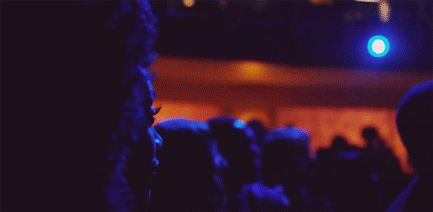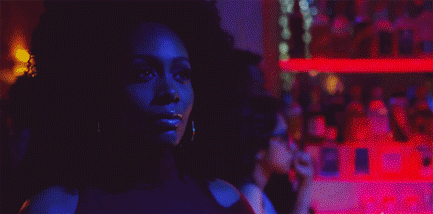It isn't a coincidence that Luke dons an expensive suit (courtesy of real-life Harlem legend
Dapper Dan) in the same episode he chooses to publicly use his superpowers. If the hoodie was a symbol of who Luke was, the suit is a symbol of who he's becoming.
Sure, Mike Colter looking fine in a suit won't surprise anyone who's seen
The Good Wife. But as I watched him shrug off bullets with ease and spark a war with Cottonmouth, I kept thinking about two things: (1)
Luke Cage's insistence on playing it safe curtails its ambitious aims, and (2) This show was obviously made by a black man from a generation older than my own.
That second point may seem minor, but it explains why I feel disconnected from its portrayal of blackness. I didn't come into
Luke Cage thinking it would cure social ills or completely shift the tide when it comes to Hollywood's representation issues. No one show could. But
Luke Cage definitely aims to spark conversations that extend beyond diversity in television.
Just look at how often the church figures into the lives of these characters.
Luke Cage makes a lot of biblical allusions. You can find them in Cottonmouth's insults of Luke as a "dishwasher Lazarus," or when he warns, "It costs to be a savior. Ask Jesus." At Pop's memorial, as a golden glow frames both men delivering their eulogies, it becomes clear how heavily the church inspires the show's ideas of manhood and respectability. But here's the thing: Christianity and the church are not as relevant to black people as they once were,
especially within my generation. The show has set up Luke as the black hero that Harlem needs: upstanding, doesn't curse, chivalrous, hates the N-word, modest. These traits in and of themselves aren't a bad thing, of course. But when Luke's principles are juxtaposed against other black male characters, the show reveals itself to be not as timely or revolutionary as it claims to be.
Watching Luke fight crime in a suit reminds me of Sidney Poitier softening his onscreen persona to become a nonthreatening star.
Luke Cage exhibits a similar choice: Every time it gets close to touching a nerve, every time it feints at reckoning with its complicated themes, the writers play it safe. It's as if they're afraid to offend Marvel's audience. Which leads to an important question: What audience is
Luke Cageaiming for?
"Just to Get a Rep" has more fundamental issues, too. It is the clumsiest episode since the premiere. Scenes feel like they have no relationship to each other. Bad pacing undermines its few good scenes. The dialogue, which felt more engaging in episodes two and three, has slowly reverted back to artlessness. This episode should be a powerhouse, especially in the wake of Cottonmouth's rocket-launcher attack and
what we learned about Luke's backstory. But it's the exact opposite.
Why has Luke decided to go public with his powers now? Heroes keep secret identities for a reason. People talk (and record) even if he's helping them. The episode's opening sequence skirts this issue, instead showing Luke as he tosses around the rubble that once made up his apartment, looking for a photo of Reva that Misty actually finds later. Meanwhile, Cottonmouth watches the musician Jidenna practice his song "Long Live the Chief" at Harlem's Paradise. Surprisingly, this is not even the episode's most on-the-nose moment.
The main thrust of "Just to Get a Rep" is Cottonmouth's rush to regain power after Luke's raid on Crispus Attucks, which threatens to be his undoing. Facing a possibly grim future, Cottonmouth decides to hit back: His crew goes from storefront to storefront, collecting "payments" from innocent Harlem residents, while making clear that they can thank Luke for the shakedown. This forces a suited-up Luke to run around Harlem, regaining people's possessions from Cottonmouth's crew. In other words, he has become a local folk hero.
It certainly seems that way, at least, when Luke shows up at Harlem's Paradise. He's unfazed by bullets and Cottonmouth's thugs. If Cottonmouth didn't believe in Luke's abilities before, he definitely does now. Even more important is Shades watching as everything goes down. It quickly dawns on him that Luke Cage is Carl Lucas, the man who did time with him at Seagate, a fact he doesn't hesitate to tell Cottonmouth later. Unfortunately, the direction of this fight sequence robs it of its urgency. The assault also seems out of character for the Luke we've gotten to know. Until now, he's been carefully strategic about using his abilities. What good does this raid accomplish? As Misty said, Luke may be bulletproof, but Harlem sure isn't.
Honestly, I'm not that interested in a pissing contest between Luke and Cottonmouth, so let's talk about the women of
Luke Cage instead. Where did they all go? This is a pivotal episode for Cottonmouth, yet Mariah is wholly absent. Misty Knight also feels oddly misused. Every time Simone Missick is onscreen, she brings determination, vulnerability, and a humanity that the writing doesn't always afford her character. And despite Missick's obvious charisma, Misty fades in and out of focus. Her animosity toward Luke is understandable, but I wish we saw a bit more of her interior life to explain why she's feeling that way. A moment of teary-eyed contemplation at Pop's memorial is not enough.
And then, there's Claire Temple (Rosario Dawson), a character who previously appeared in
Daredevil and
Jessica Jones. We're reintroduced to Claire in a great way: When a thief snags her purse, she doesn't hesitate to bolt after him. Claire gets her purse back, and the thief winds up nursing quite a few bruises. Badass? Very. "If you don't fight back, they'll make you into a doormat," she tells her mother Soledad (Sonia Braga). Claire has returned to Harlem because she's trying to figure things out in the wake of being blacklisted by her old hospital. After a bit of expositional musing, she realizes what she wants to do: She'll use her nursing skills to help people with superpowers. Claire will definitely continue to be the connective tissue between Marvel's Netflix shows, but time will tell if
Luke Cage finds better use for her than
Daredevil and
Jessica Jones did. I have loved Dawson for ages, so I would be thrilled if Claire finally lands a significant role this season. But I won't be holding my breath.
Luke Cage stands out from its Marvel predecessors by being a bit bolder, a bit looser, and a bit more willing to engage with the real world. We see this whenever the show mentions great black men. In this episode, the most notable reference occurs during an exchange between Luke and Zip, one of Cottonmouth’s more odious thugs:
Luke: "Think about where you are. It's hallowed ground, this park. Named for Jackie Robinson. It's here all around if you respect yourself enough to take a look."
Zip: "At what?"
Luke: "Our legacy."
Apparently, this legacy doesn't include black women. For a series that postures itself as a radical exploration of black history under the guise of a superhero drama,
Luke Cage has an extremely limited perspective. Black women keep black communities thriving. Black women have been on the ground of every black political movement, from the Underground Railroad to Black Lives Matter. There is no revolution unless black women are involved. And yet, despite its artistic and historical influences,
Luke Cage rarely includes black women among the black heroes it celebrates. Five episodes in, this no longer seems like a blind spot. It seems like ignorance.


 luke cage really influencing you. ready to give me an uppity speech about where we're standing, and how im desecrating my ancestors?
luke cage really influencing you. ready to give me an uppity speech about where we're standing, and how im desecrating my ancestors? 







 the whole time
the whole time 







